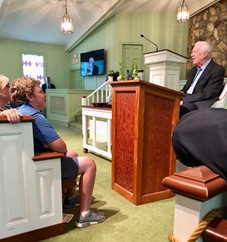What It’s Like to Be a Junior During AP Week
May 15, 2018
By Samantha Brant ‘19, Contributor; Molly Briggs ‘19, News Editor; Nellie Shih ‘19, Arts and Entertainment Editor
It’s an hour after the AP Chem exam. You feel dead inside. Mrs. Butler tells you to come eat ice cream cake. You think, maybe this will make up for everything. Maybe this will make you feel happy. You get a slice. It’s half chocolate, half vanilla. You pick through the parts you like. The remaining carcass of a cake sits before you. You then have an out-of-body experience:
You see your plate slipping out of your hand. It falls to the ground, cake-side down. The cake has been ruined. It is on the science room floor. No food. No cake. You don’t even like the cake that’s left. But your cake has been ruined. You have dropped it. You are a failure. You begin to cry.
People begin to stare. “Are you okay?” they ask. No, you’re not. You continue to cry. Your cake has fallen. You have nothing left.
It’s Sunday night. The night before the AP Chem test that counts for 40% of your 4th quarter grade. It was 11 pm. You had been studying for 12 hours. But it was all okay. Because there was Graeter’s cookies and cream ice cream in the freezer. That ice cream was going to make it all okay. You walk downstairs and open the freezer. But the ice cream was gone. Your brother had eaten it. You stared at the freezer as tears welled in your eyes. You crumple to the floor. Your mom asked you if you were okay. You told her you were fine. You weren’t fine. Nothing was fine. Nothing would ever be fine.
It’s Tuesday night. You have your AP Lit exam the next morning. It’s 2AM. You decide to take a practice test in your Barron’s book. There are 55 questions. You get 26 questions right. That’s a 47%. You say to yourself, “Nice. I failed.” You read the explanations for the right answers. The explanations don’t make sense. None of this make sense. You go to bed. You’ve given up. You’re no longer invested.
You had spent 6 hours on APUSH homework: the practice AP and the reading guide. Now you’re in APUSH class. Dr. Tyrrell asks you if you are okay. You tell her about how long you spent on APUSH homework over the weekend. Your friend leans over and tells you to add the amount of time you spent crying. At least 30 minutes. You laugh. Everyone laughs. Dr. Tyrrell looks concerned. Now you’re crying. Tears are streaming down your face. You can’t stop laughing. Dr. Tyrrell asks you if you are okay (again). She realizes that she has broken you. You are broken.
You’re reviewing titration with your teacher. “What amount of HCl needs to be added for pH to equal pKa plus the log of the base over the acid?” she asks. You don’t know. You don’t know anything. You don’t know why you’re crying. Your friends look concerned. They don’t know what to do. Class ends. Your teacher wants to speak with you. They apologize for making you cry. You start crying more. You leave the room.
Later, your friend asks you if you’re okay at lunch. Yes. You’re okay. You’re trying not to cry again. Your friend doesn’t believe you.
“I saw you and your friend outside the science room earlier and I tried to wave to you guys but you guys didn’t see me,” another friend tells you. “What were you guys doing out there?”
What were you doing there?
“Crying.”
“Oh, that sucks. I’m sorry.”
“It’s chill.”
“Was that your first breakdown over APs?”
Surprisingly, yes. You tell him. He tells you that he had a breakdown too.
You’re all breaking down.














Aadhya • May 16, 2018 at 6:03 pm
Thank you for this relatable article??